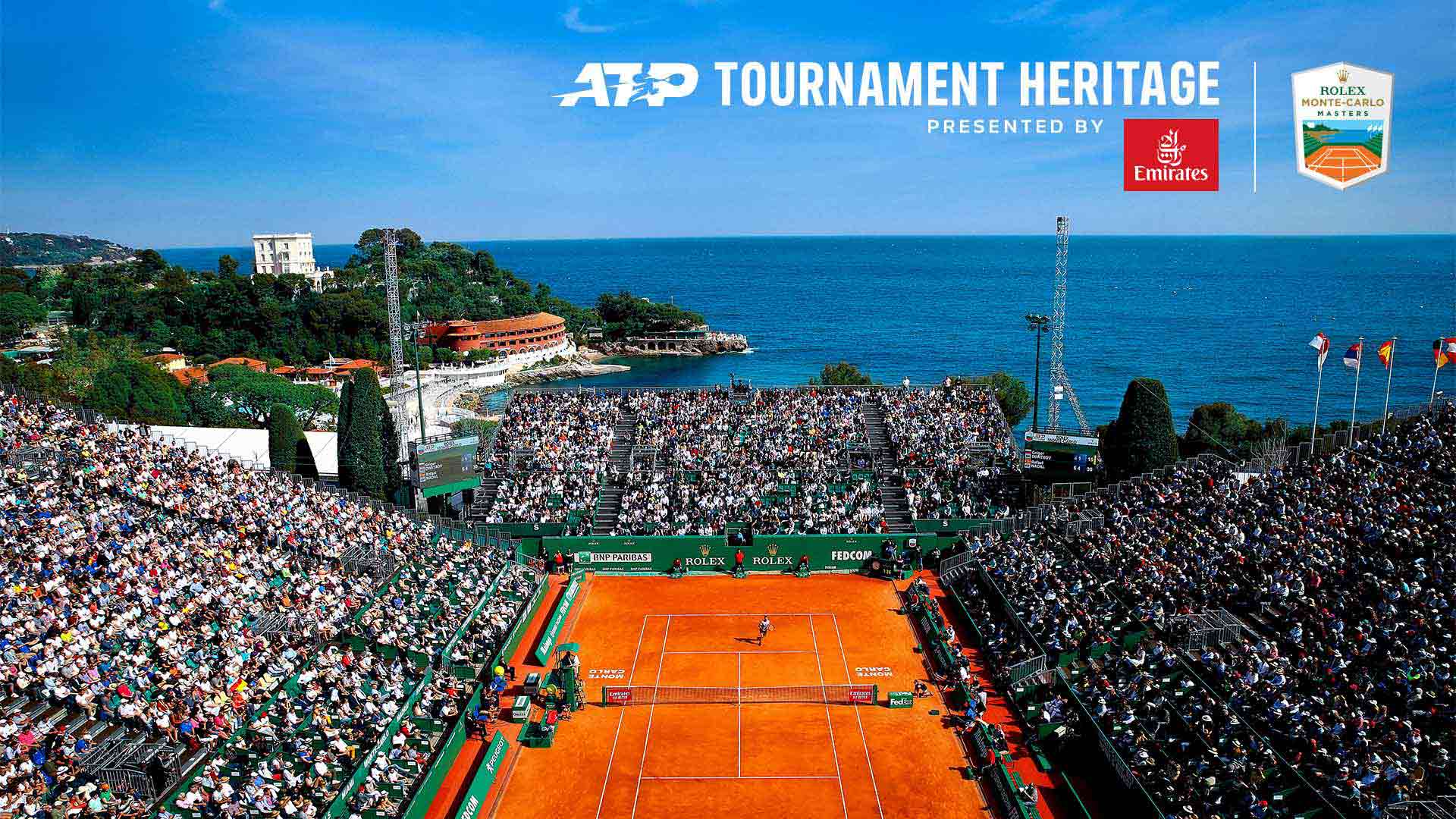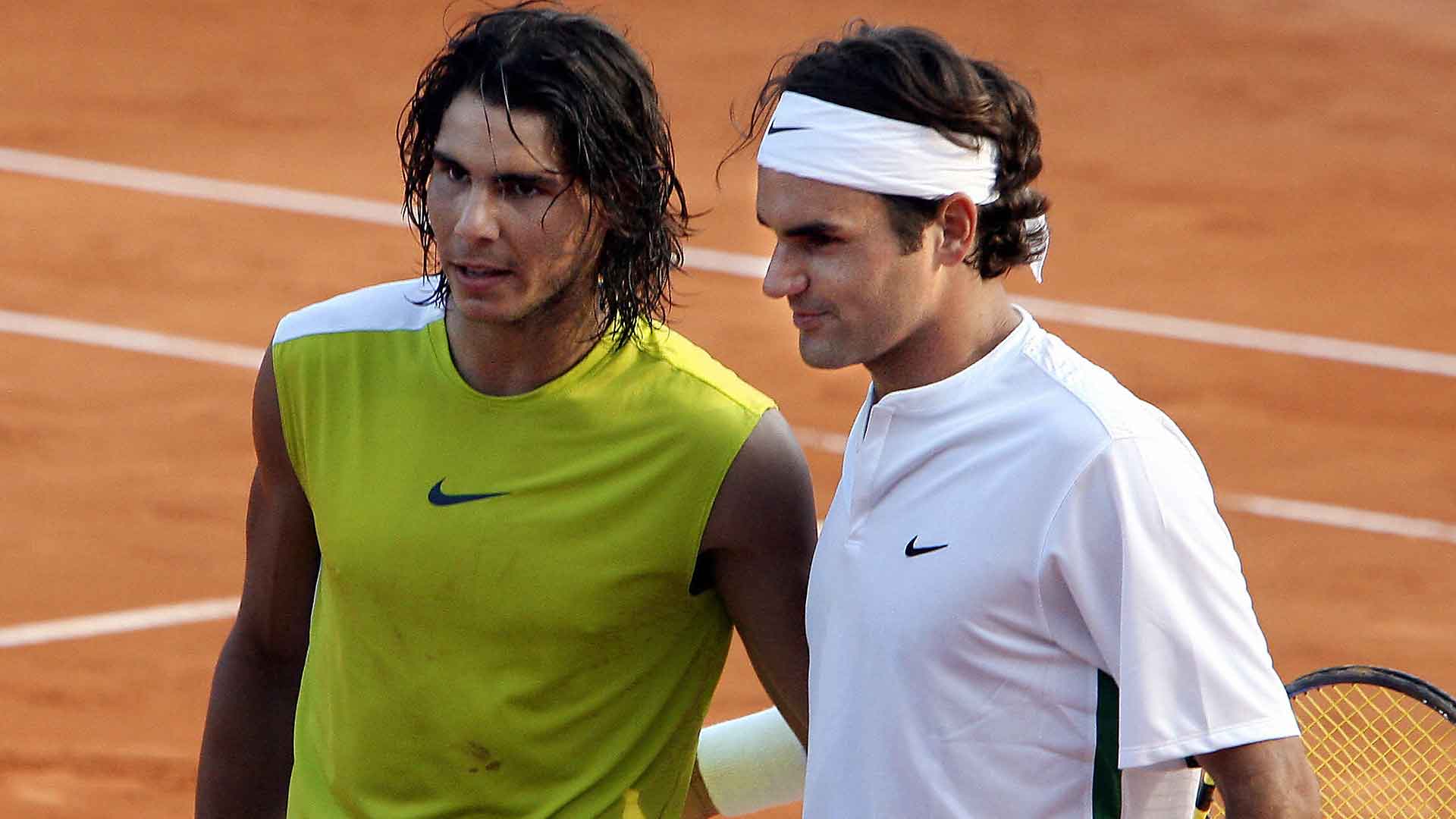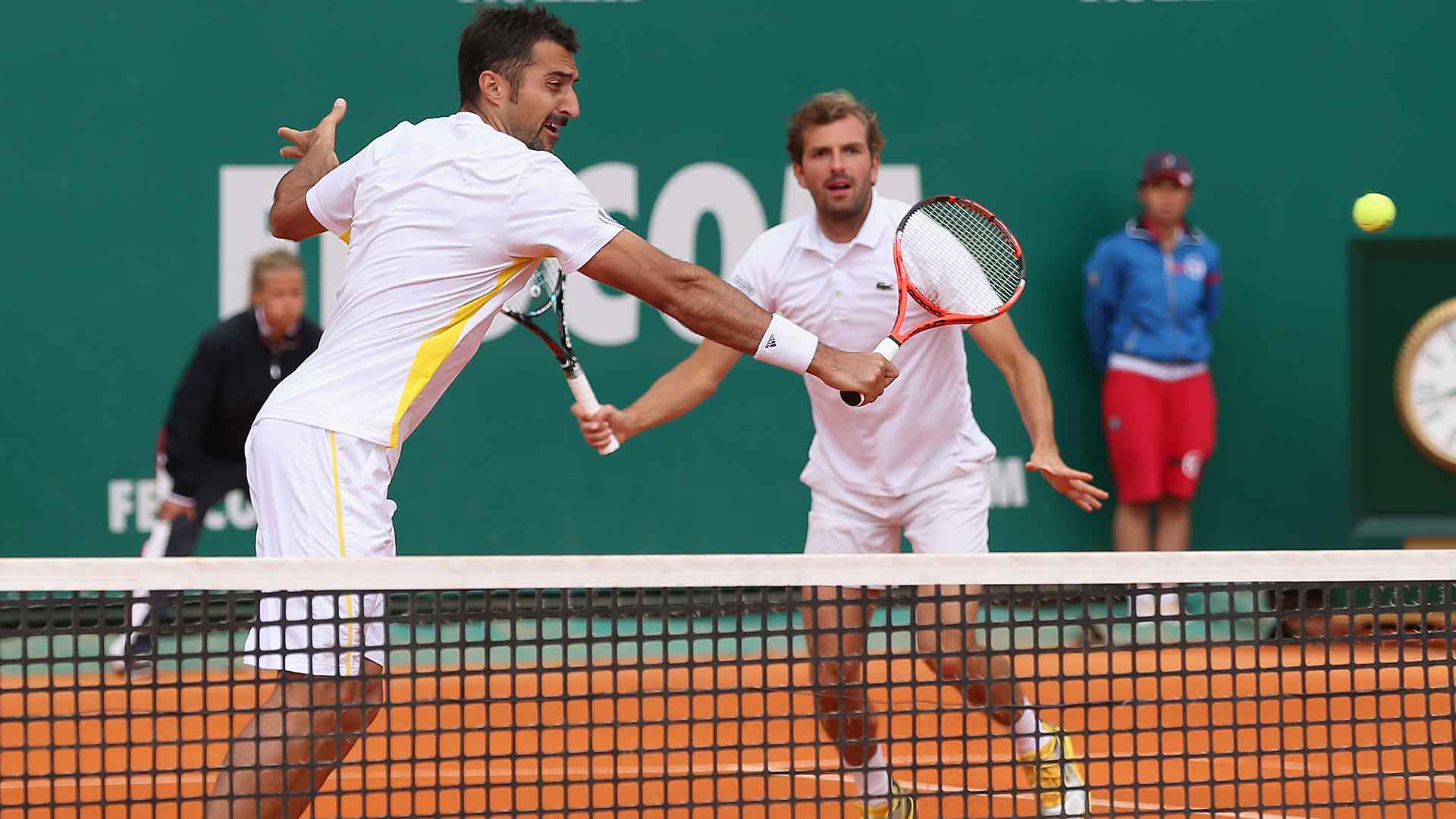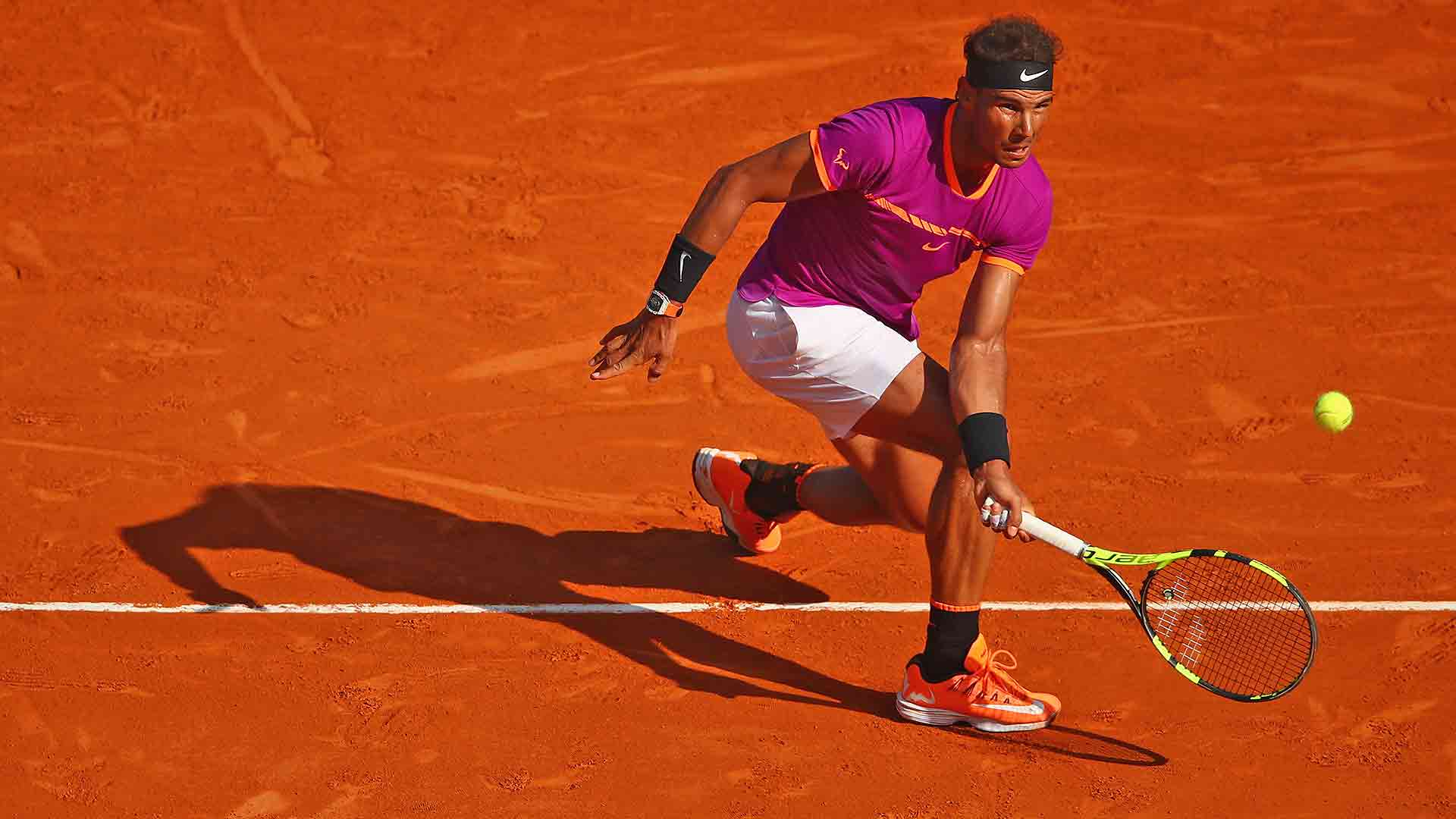
Editor’s note: A version of this story was first published on 15 April 2020
The Rolex Monte-Carlo Masters, which begins on Sunday, is one of the crown jewels of the ATP Tour. First held in 1897, the event was a founding member of the ATP Masters 1000 series in 1990. One of the most spectacular venues in world tennis, overlooking the Mediterranean, the tournament was a combined event until 1980.
ATPTour.com looks back on 10 memorable moments from Monte-Carlo since 1990.
1995: Muster The Ironman
It was a second serve that missed; a double fault that let Thomas Muster escape and saw Boris Becker ultimately fall short for the fifth time in a clay-court final. Becker went for an ace on his first match point, because it was his natural game, but years later, when he ended his career, the German was left to rue one of the toughest losses of his career. Muster saved two match points from 4/6 down in the fourth-set tie-break and ultimately prevailed 4-6, 5-7, 6-1, 7-6(6), 6-0 in three hours and 16 minutes. “I don’t know how I won the match,” said Muster, afterwards. “After what happened yesterday, I didn’t think I could be able to play today. I would like to thank the medical service that got me ready to play.” It was all the more remarkable as the Austrian had experienced fatigue, dehydration and a lack of sugar in his blood in his semi-final victory over Andrea Gaudenzi, the current ATP Chairman, the day before. Muster extended his clay-court winning streak to 22 matches with his second Monte Carlo crown.
2000: A French Champion, At Last!
Cedric Pioline ended a 37-year wait for a champion in Monaco by claiming the biggest title of his career. In testing conditions, with steady rain falling throughout the final, the 30-year-old battled past Slovakian Dominic Hrbaty 6-4, 7-6(3), 7-6(6) to the delight of a capacity crowd. “It was very tough because Dominik played really well,” Pioline said. “I am running like when I was 20. I am really enjoying what I am doing. That is why I am still playing. I am really proud to win because there is a great tradition here.” Pioline was the first French player to win the Monte Carlo crown since Pierre Darmon in 1963. The 22-year-old Hrbaty had beaten top seed Yevgeny Kafelnikov and 1997 finalist Alex Corretja en route to the final. Since Pioline’s title run, Gael Monfils is the only Frenchman to reach the final – in 2016.

2006: The 100th Edition, First Part Of Nadal vs. Federer Trilogy
It was only fitting that the 100th edition of the Rolex Monte-Carlo Masters culminated in a final between two great players, World No. 1 Roger Federer and Rafael Nadal, the defending champion. At the height of their rivalry, Nadal and Federer met 15 times over a three-year period (2006-2008). In the 2006 final, certainly the highest quality of their three Monte Carlo finals, Nadal needed to dig deep to extend his clay-court winning streak to 42 matches, beating Federer 6-2, 6-7(2), 6-3, 7-6(5) over three hours and 49 minutes. Nadal raced to a 5-1 lead in the first set, but Federer regrouped in the second set after losing his serve to love in the seventh game. Federer broke back for 5-5 and won the tie-break. The Swiss also led 3/0 in the fourth set tie-break, but Nadal recovered to seal the 14th title of his career. “It was a very unbelievable day for me,” said Nadal. “It’s special to begin the clay season like this. Beating Roger in the final is even more special, it’s great.” The Spaniard would also beat Federer 6-4, 6-4 in the 2007 final and 7-5, 7-5 in the 2008 final, for his fourth successive Monte Carlo crown.
2007: Monte Carlo’s Status In The Spotlight
The status of the Rolex Monte-Carlo Masters had first come into question in 1997, but the then-Tournament Director Bernard Noat fought tenaciously to maintain the event as a Super 9 (now ATP Masters 1000). Ten years on, and with the tournament now under the direction of Zeljko Franulovic, the ATP Tour looked to reduce the number of Masters 1000 tournaments from nine to eight for a planned restructure of the 2009 calendar. The tournament, with His Serene Highness The Sovereign Prince of Monaco as the Patron of the Rolex Monte-Carlo Masters, remains as a Masters 1000 event, but without the mandatory player commitment. As a beloved member of the series; a glamorous event to visit and be seen at, the Monte-Carlo Country Club is arguably the most spectacular of all world tennis venues.
2010: Nadal Loses 14 Games!
When Nadal steps onto Court Central at the Monte-Carlo Country Club for the first time, every Wednesday afternoon each year, close your eyes and listen to the crowd’s approval. In 2010, spectators could only gasp as five-time defending champion Nadal, without a title for 11 months, ripped through the field for the loss of just 14 games in five matches. “Last year I did not play well [here] but I won,” said Nadal, after his 6-0, 6-1 victory over fellow Spaniard Fernando Verdasco in the final. “This year my level is completely different. This year is really special for me because I had a little bit of a hard time for the last year. I was back to my best level on 1 January. I was ready to win before this tournament.” The 23-year-old beat Thiemo de Bakker 6-1, 6-0 in the first round, Michael Berrer by the same scoreline in the second round, two-time former champion Juan Carlos Ferrero 6-4, 6-2 in the quarter-finals and David Ferrer 6-2, 6-3 in the semi-finals. Nadal became the first man to win six consecutive titles at the same tournament in the Open Era and joined Federer on 16 Masters 1000 crowns, one behind the then all-time leader Andre Agassi (17).

2013: A Tense Finale For Benneteau & Zimonjic
Such is the nature of modern doubles, where no Advantage is played in the first two sets and a first-to-10 Match Tie-break has been adopted on the ATP Tour since 2006, that the action is always entertaining and frenetic. In the 2013 final, Julien Benneteau and Nenad Zimonjic, in their first tournament together, saved seven match points against World No. 1s Bob Bryan and Mike Bryan in a 4-6, 7-6(4), 14-12 victory. The French-Serbian pair saved match point at 4-5 in the second set, then six — at 5/9, 9/10 and 11/12 — in the Match Tie-break, for a famous victory over the Bryans, the two-time defending champions. Benneteau admitted, “We were a little bit lucky of course. When you save seven match points, you need a little bit of luck. But we played very well on those points. We still believed in ourselves until the end and it paid off.” Zimonjic added, “It was unbelievable. They started unbelievable [after the rain break], without missing any shots. Julien had to hit an ace on the second serve at 5-4, and also had an unbelievable return of the first serve to save another match point.” The Bryans, who will retire from the sport in 2020, have captured six Monte Carlo doubles trophies.
2013: Djokovic Ends Nadal’s Eight-Year Reign
Such has been the dominance of Nadal that Franulovic, half-jokingly, said to the Spaniard during a rain delay in 2012, “‘Hey Rafa, it seems to me that our destinies are linked. As long as you keep winning, I should be okay as well. I count on you to win this event, otherwise I get fired!’” The following year, Nadal’s eight-year reign came to an end at the hands of Novak Djokovic, 6-2, 7-6(1), in the final. World No. 1 Djokovic, who had struggled with an ankle injury in the early rounds, admitted, “The first six, seven or eight games were unbelievable. It’s the best I can play on clay. This trophy could not come in a better moment. It was difficult the last two months. I’ve been through some ups and downs emotionally, physically. But I’m where I want to be.” The victory broke Nadal’s 46-match winning streak at the Monte-Carlo Country Club that dated back to a third-round loss to Guillermo Coria on his debut in 2003.
2014: Wawrinka Takes His Chance
In the first all-Swiss final for 14 years on the ATP Tour, Monte Carlo resident Stan Wawrinka took his chance to capture his first Masters 1000 crown after pre-tournament favourite Nadal lost in the quarter-finals. Wawrinka recorded a 4-6, 7-6(5), 6-2 victory over Federer, who finished runner-up in the Principality for a fourth time (also 2006-2008). “I can see that when mentally I’m there and I’m fighting, I can play tennis, I can beat all the players,” said World No. 3 Wawrinka, after capturing his third title of the season. “When I came here, for me it was more like a test. I knew I was playing good tennis, but I didn’t expect to win because the draw was so strong.” Federer, who had beaten Djokovic in the semi-finals and had won 13 of his past 14 matches against Wawrinka, admitted, “I think he deserved it just a little bit more.”

2017: Nadal’s La Décima
Such has been Nadal’s dominance of the Spring European clay-court swing since 2005, that it was inevitable, yet no less astonishing, that the Spaniard would become the first man in the Open Era (since April 1968) to win a singles tournament on 10 or more occasions. His historic 6-1, 6-3 victory over fellow Spaniard Albert Ramos-Vinolas in the 2017 Monte Carlo final, gave Nadal a 50th clay-court crown (50-8), breaking the record he shared with Guillermo Vilas since 24 April 2016. “It really is unbelievable,” said Nadal. “To win 10 times at such an important event like Monte Carlo is something difficult to describe my feelings. Every year has been a different feeling. At the same time, it is always a unique moment, every time, I have this trophy with me. [Of course] there is a little bit of luck, lot of things coming together to win this 10th title in an event like Monte Carlo. I feel lucky to keep playing tennis [and] being healthy all those years, in order to compete in one of the most beautiful events of the year, without a doubt.” The following week, he subsequently went on to capture his 10th Barcelona Open Banc Sabadell crown.
2019: Tears For Fabio
Go down the Honour Roll of the Rolex Monte-Carlo Masters and you’ll see a plethora of Spanish names over the past 30 years, but no sign of any Italians. In fact, you need to go back to Nicola Pietrangeli, who won his third crown in 1968, to find the last Italian singles winner. But that changed in 2019, when the France-Italy border, only 30 minutes away by car from Monaco, witnessed increased traffic during the tournament week as Fabio Fognini worked his way to the title. Entering with one win in his past eight matches, which left him contemplating surgery for ankle and elbow injuries, Fognini recorded wins in Monaco over Andrey Rublev, Alexander Zverev, Borna Coric and three-time defending champion Nadal in the semi-finals. He got the cherry on the cake with a 6-3, 6-4 win over Dusan Lajovic to become the first Italian to capture a Masters 1000 title. “I’m really, really happy. Nothing to say,” said Fognini. “I have to keep calm, maybe take a shower, relax, and think about this, because it’s something incredible. I just feel happy because I won a big tournament that was always my goal in my career.”
